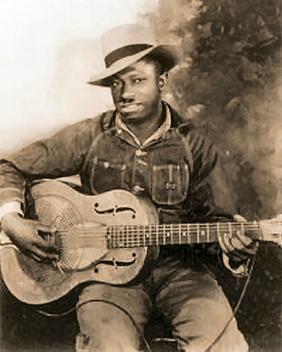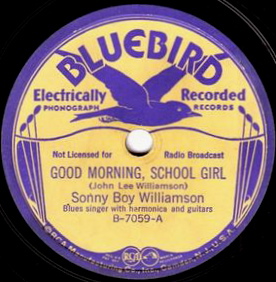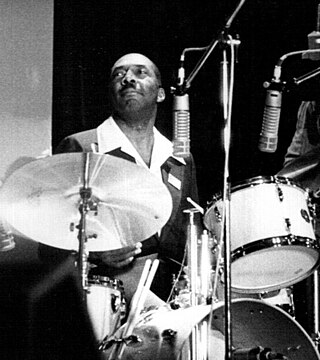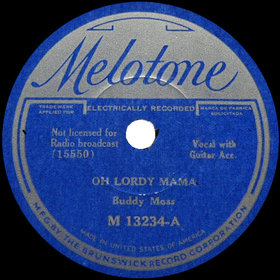Related Research Articles
Chicago blues is a form of blues music that developed in Chicago, Illinois. It is based on earlier blues idioms, such as Delta blues, but is performed in an urban style. It developed alongside the Great Migration of African Americans of the first half of the twentieth century. Key features that distinguish Chicago blues from the earlier traditions, such as Delta blues, is the prominent use of electrified instruments, especially the electric guitar, and especially the use of electronic effects such as distortion and overdrive.

Alex or Aleck Miller, known later in his career as Sonny Boy Williamson, was an American blues harmonica player, singer and songwriter. He was an early and influential blues harp stylist who recorded successfully in the 1950s and 1960s. Miller used various names, including Rice Miller and Little Boy Blue, before calling himself Sonny Boy Williamson, which was also the name of a popular Chicago blues singer and harmonica player. To distinguish the two, Miller has been referred to as Sonny Boy Williamson II.

John Lee Curtis "Sonny Boy" Williamson was an American blues harmonica player, singer and songwriter. He is often regarded as the pioneer of the blues harp as a solo instrument. He played on hundreds of recordings by many pre–World War II blues artists. Under his own name, he was one of the most recorded blues musicians of the 1930s and 1940s and is closely associated with Chicago producer Lester Melrose and Bluebird Records. His popular songs, original or adapted, include "Good Morning, School Girl", "Sugar Mama", "Early in the Morning", and "Stop Breaking Down".

"You Shook Me" is a 1962 blues song recorded by Chicago blues artist Muddy Waters. Willie Dixon wrote the lyrics and Earl Hooker provided the instrumental backing; the song features Waters' vocal in unison with Hooker's slide-guitar melody. "You Shook Me" became one of Muddy Waters' most successful early-1960s singles and has been interpreted by several blues and rock artists.
The Real Folk Blues is a series of blues albums released between 1965 and 1967 by Chess Records, later reissued MCA Records. Each album in the series highlighted the music of one major Chess artist, including John Lee Hooker, Howlin' Wolf, Muddy Waters, and Sonny Boy Williamson II. The series, overseen by Marshall Chess, was a reaction to the increasing audience for the blues following the British Invasion. Companion discs, titled More Real Folk Blues, were released for many of the artists. Hooker's companion disc was not released until 1991. Beginning in 1999 the albums were re-released as single-disc compilations.
The American Folk Blues Festival was a music festival that toured Europe as an annual event for several years beginning in 1962. It introduced audiences in Europe, including the UK, to leading blues performers of the day such as Muddy Waters, Howlin' Wolf, John Lee Hooker and Sonny Boy Williamson, most of whom had never previously performed outside the US. The tours attracted substantial media coverage, including TV shows, and contributed to the growth of the audience for blues music in Europe.

Hudson Whittaker, known as Tampa Red, was an American Chicago blues musician.

"Killing Floor" is a 1964 song by American blues singer-songwriter and guitarist Howlin' Wolf. Called "one of the defining classics of Chicago electric blues", "Killing Floor" became a blues standard with recordings by various artists. It has been acknowledged by the Blues Foundation Hall of Fame, which noted its popularity among rock as well as blues musicians. English rock group Led Zeppelin adapted the song for their "The Lemon Song", for which Howlin' Wolf is named as a co-author.

Robert Petway was an American blues singer and guitarist. He recorded only 16 songs, but it has been said that he was an influence on many notable blues and rock musicians, including John Lee Hooker, Muddy Waters, and Jimi Hendrix. There is only one known picture of Petway, a publicity photo from 1941. His birth name may have been Pettyway, Pitway, Petaway, or similar.

"Sitting on Top of the World" is a country blues song written by Walter Vinson and Lonnie Chatmon. They were core members of the Mississippi Sheiks, who first recorded it in 1930. Vinson claimed to have composed the song one morning after playing at a white dance in Greenwood, Mississippi. It became a popular crossover hit, and was inducted into the Grammy Hall of Fame in 2008.

"Good Morning, School Girl" is a blues standard that has been identified as an influential part of the blues canon. Pre-war Chicago blues vocalist and harmonica pioneer John Lee "Sonny Boy" Williamson first recorded it in 1937. Subsequently, a variety of artists have recorded versions of the song, usually calling it "Good Morning Little Schoolgirl".
"Chicago" Bob Nelson was an American blues musician.

Odie Payne was an American Chicago blues drummer. Over his long career he worked with a range of musicians, including Sonny Boy Williamson II, Muddy Waters, Jimmy Rogers, Eddie Taylor, Little Johnny Jones, Tampa Red, Otis Rush, Yank Rachell, Sleepy John Estes, Little Brother Montgomery, Memphis Minnie, Magic Sam, Chuck Berry, and Buddy Guy.

"Crosscut Saw", or "Cross Cut Saw Blues" as it was first called, is a hokum-style song "that must have belonged to the general repertoire of the Delta blues". Mississippi bluesman Tommy McClennan's recording of the song was released in 1941 and has since been interpreted by many blues artists. "Crosscut Saw" became an early R&B chart hit for Albert King, "who made it one of the necessary pieces of modern blues".

"Hey Lawdy Mama" is a Piedmont blues song recorded by Buddy Moss in 1934. The song became popular among jazz musicians with early recordings by Count Basie and Louis Armstrong. In 1943, a version recorded by Andy Kirk and His Twelve Clouds of Joy, with vocals by June Richmond, was a hit, reaching number four on the Billboard R&B chart.
"Early in the Morning" is a blues song that was recorded by Sonny Boy Williamson I in 1937. Identified as one of his most successful and influential tunes, it was inspired by earlier blues songs. "Early in the Morning" has been recorded by various musicians, including Junior Wells, who made it part of his repertoire.

"Bottle Up and Go" or "Bottle It Up and Go" is a song that is a standard of the blues. Based on earlier songs, Delta bluesman Tommy McClennan recorded "Bottle It Up and Go" in 1939. The song has been interpreted and recorded by numerous artists, sometimes using alternate titles, such as "Step It Up and Go", "Shake It Up and Go", etc.
Johnny "Big Moose" Walker was an American Chicago blues and electric blues pianist and organist. He worked with many blues musicians, including Ike Turner, Sonny Boy Williamson II, Lowell Fulson, Choker Campbell, Elmore James, Earl Hooker, Muddy Waters, Otis Spann, Sunnyland Slim, Jimmy Dawkins and Son Seals.
L.C. Greene, better known as L.C. Green, was an American blues guitarist, singer and songwriter.
References
- 1 2 3 4 Herzhaft, Gerard (1992). "Sugar Mama Blues" . Encyclopedia of the Blues. University of Arkansas Press. p. 473. ISBN 1-55728-252-8.
- 1 2 Murray, Charles Shaar (2002). Boogie Man: The Adventures of John Lee Hooker in the American Twentieth Century. Macmillan. p. 345. ISBN 978-0-312-27006-3.
- ↑ Charley Jordan recorded a different "Sugar Farm Blues" in 1932 (Vocalion 1717).
- ↑ Melotone M12958, listed as "Poor Jim with Dan Jackson"
- ↑ Congress, Richard (2001). Blues Mandolin Man: The Life and Music of Yank Rachell . University Press of Mississippi. p. X. ISBN 978-1-57806-334-5.
- ↑ Humphrey, Mark (1994). Tampa Red: The Guitar Wizard (Compilation liner notes). Tampa Red. Columbia /Legacy Records. p. 4. CK 53235.
- ↑ Vocalion 2753
- ↑ Fancourt, Les (1995). Sugar Mama: The Essential Recordings of Sonny Boy Williamson (Compilation liner notes). Sonny Boy Williamson I. Indigo Records. p. 2. IGOCD 2014.
- ↑ 1940 Bluebird 8760
- ↑ 1952 Chess 1515 and 1965 from It Serves You Right to Suffer
- ↑ 1959 Kent 329
- ↑ Chess 1911
- ↑ Williamson, Nigel (2007). The Rough Guide to Led Zeppelin. Penguin. p. 21. ISBN 978-1405384216.
- ↑ Grow, Kory (8 June 2015). "Hear Led Zeppelin's Rare, Riotous Blues Rave-Up 'Sugar Mama'". Rolling Stone . Retrieved 9 June 2015.